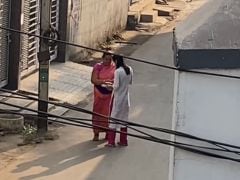Weight loss is inarguably the most searched topic on the internet, and numerous opinions abound regarding the role of carbohydrate elimination in expediting this process. This phenomenon often leads individuals to forgo rice and roti, especially during dinner, in hopes of sidestepping excess fat accumulation. However, the question persists: Do these quintessential Indian staples genuinely contribute to weight gain? Is it sustainable to entirely eschew rice and roti? This enduring quandary within the realm of health and nutrition has left us ensnared in a web of confusion, oscillating between fact and fiction. But the era of uncertainty ends now. Determined to discern the truth and quash this misconception once and for all, we embarked on an investigation. In this pursuit, we stumbled upon a post by dietician Richa Gangani, elucidating whether rice or roti can grace our dinner tables. As per her expert opinion, "You need not bid adieu to either of them to facilitate weight loss."
Are Carbohydrates Really Bad For Your Health?
Let's address the matter forthrightly - carbohydrates stand as a pivotal nutrient that sustains our vitality and energy levels throughout the day. Now, the inquiry arises: Why is carbohydrate singled out as the primary 'culprit' behind weight gain? This designation stems from the fact that a significant portion of our carbohydrate intake consists of refined carbs, which precipitate rapid spikes in the body's glucose levels, consequently ushering in an array of associated health issues, including weight gain and diabetes risk. Instead of completely forsaking carbohydrates, the prudent approach involves identifying healthful sources and integrating them into our daily dietary regimen. For those unfamiliar, unprocessed foods enriched with protein and fibre, and boasting a low glycemic index are hailed as commendable sources of carbohydrates.
Is It Safe To Have Rice And Roti For Dinner?
In India, rice and roti reign as dietary staples. These staple foods are not only budget-friendly and easily accessible but also represent two principal sources of carbohydrates. Beyond that, rice and roti pack a punch of indispensable vitamins and minerals, essential for fulfilling our daily nutritional needs. According to Richa Gangani, "Rice and chapati each offer distinct health benefits. While rice and dal, when combined, present a complete protein source with all essential amino acids, having chapati crafted from barley, sorghum, finger or pearl millet, along with a dash of wheat as a binding agent, can supply nutrients such as calcium, phosphorus, and zinc." This underscores that relinquishing either rice or roti could entail missing out on comprehensive nourishment essential for overall well-being.
Gangani advocates for portion control as the crux of effective weight loss, stating, "By managing your meal portions, you can relish both without hesitation. No particular grain should bear the blame for inducing weight gain."
Also Read: Healthy Eating At Night: 5 Tips For The Right Dinner Routine
The Bottom Line
After reading through this article, are you considering getting rice and roti back to your dinner plate? While that sounds perfect, we suggest, seeking expert guidance to determine the appropriate portion for enjoying your dinner without risks of weight gain. Always remember the key to sustainable weight loss is time, patience and dedication.
Disclaimer: This content including advice provides generic information only. It is in no way a substitute for qualified medical opinion. Always consult a specialist or your own doctor for more information. NDTV does not claim responsibility for this information.
